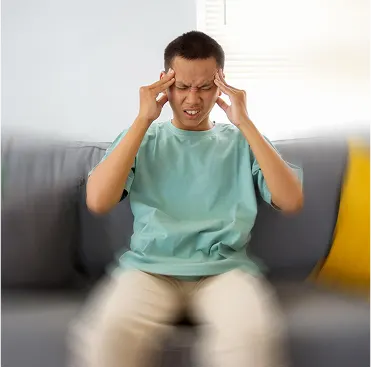That sudden spinning sensation or feeling lightheaded can be unsettling.
Vertigo and dizziness are not illnesses themselves but symptoms that point to underlying conditions.
They may be temporary or recurring, mild or severe.
Knowing the common causes and remedies can help you manage these sensations better and decide when it is time to seek trained medical aid or treatment
Causes of Vertigo and Dizziness
1. Inner ear problems
Conditions like benign paroxysmal positional vertigo (BPPV), Meniere’s disease, or ear infections disturb the balance system in the inner ear, often leading to vertigo.
2. Low blood pressure
A sudden drop in blood pressure when standing up quickly can cause brief dizziness or fainting.
3. Dehydration
Not drinking enough fluids reduces blood volume and affects circulation, making you feel lightheaded.
4. Medication side effects
Certain antibiotics, blood pressure medicines, and sedatives may trigger dizziness as a side effect.
5. Neurological conditions
In rare cases, migraines, multiple sclerosis, or stroke can cause persistent dizziness or vertigo.
6. Anxiety and stress
Mental health can also play a role, where heightened anxiety leads to sensations of imbalance.
Remedies for Vertigo and Dizziness
1. Hydrate well
Drinking enough water throughout the day prevents dizziness caused by dehydration.
2. Rest and relaxation
Lie down in a comfortable position if you feel lightheaded and give your body a chance to recover.
3. Epley maneuver
For BPPV, doctors often recommend a series of head movements known as the Epley maneuver to reposition inner ear crystals that cause vertigo.
4. Balanced diet
Eating smaller, regular meals helps maintain blood sugar and prevents sudden drops that may trigger dizziness.
5. Limit caffeine and alcohol
Both can affect inner ear function and worsen dizziness in some people.
6. Medication under medical advice
In cases of recurring vertigo, doctors may prescribe medicines to ease nausea and improve balance.
But do remember,
You should consult a healthcare professional if:
- Dizziness is frequent or lasts for long periods
- It is accompanied by fainting, chest pain, or shortness of breath
- You experience double vision, slurred speech, or weakness in limbs
- Over-the-counter remedies and rest do not help

Orthomed Clinic at Nagarbhavi, always can help you get better treatment for these ailments.
Vertigo and dizziness can be uncomfortable, but they often have manageable causes.
Staying hydrated, eating well, practicing balance exercises, and seeking timely medical help are effective ways to keep the symptoms in check. By understanding the triggers, you can take practical steps to reduce episodes and regain control of your balance.
Latest News & Blogs

Digital Detox: Why Taking a Break from Screens Helps Your Health
Benefits of a Digital Detox for Mind and Body

Food Poisoning: Signs to Watch and Tips for a Faster Recovery
Food Poisoning Symptoms and Recovery Tips

Understanding Early symptoms of Heart Disease
Early Warning Signs of Heart Disease You Shouldn’t Ignore



